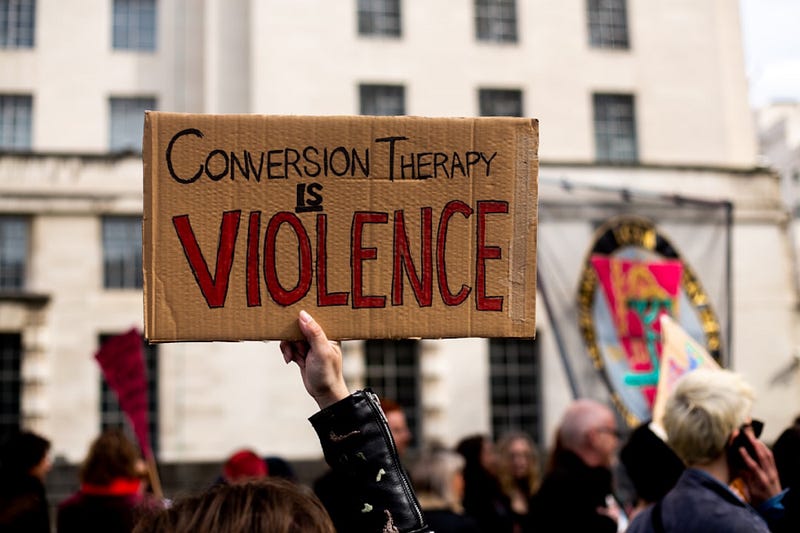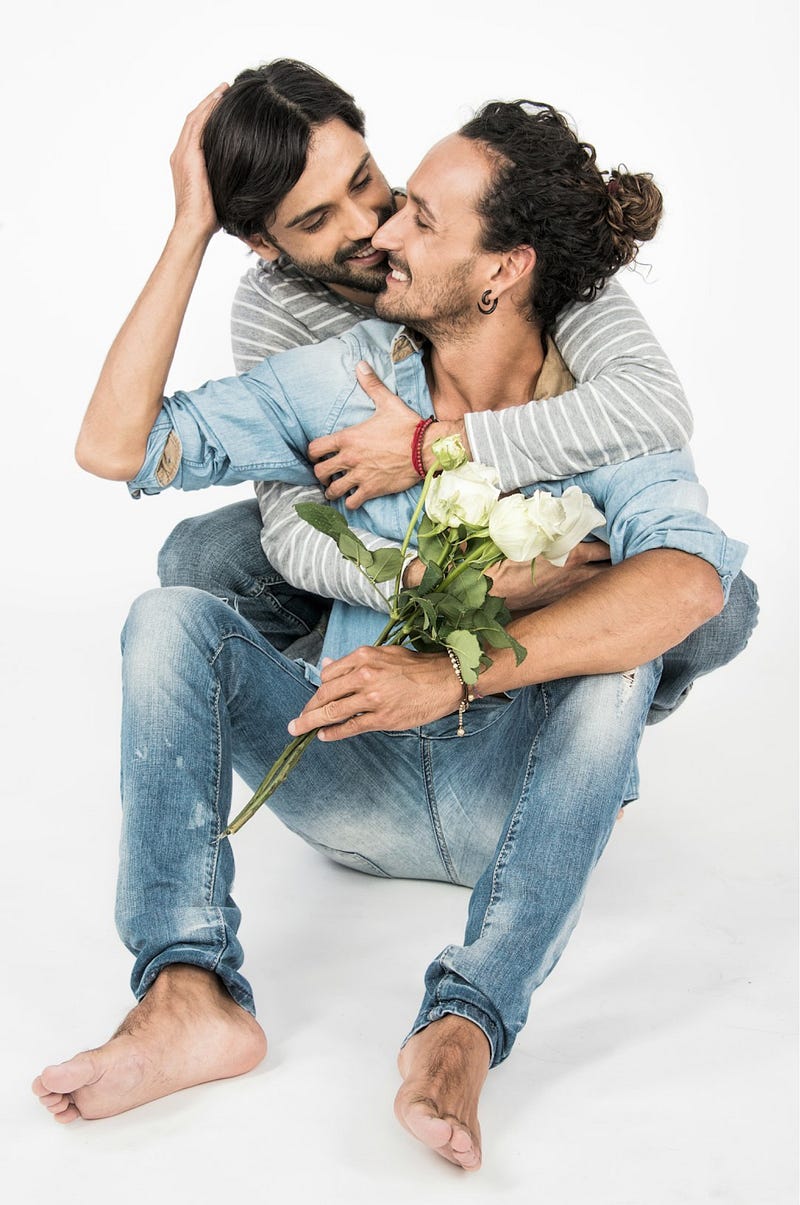Conversion therapy is a widely controversial and discredited harmful practice aimed at changing an individual’s sexual orientation or gender identity. It has profound long-term effects on mental health and interpersonal relationships. Continue reading for more information on how experiencing conversion therapy can distort your self-perception and potentially foster codependent behaviors in relationships; at the end, we’ll explore what it means to strive toward co-regulation and healthy dependency as a generative process through trauma.
What is Codependency?
The terms “codependency” and “co-regulation” often surface in relationships and in the therapy room.
Codependency refers to the behaviors in a relationship where one person enables another’s addiction, poor mental health, immaturity, irresponsibility, or underachievement. The codependent person often puts aside their own needs to take care of someone who is ill or struggles with addiction. Let’s look at the relationship between Sarah and Tom as an example.

Photo by Ayo Ogunseinde on Unsplash
Sarah and Tom’s Story
Sarah always thought she was simply a supportive partner to Tom. She handled everything — from paying bills to managing Tom’s multiple doctor appointments for his chronic back pain and the medication prescribed often linked to his sporadic opioid use. Over time, Sarah realized she was neglecting her own health and career. Her therapist pointed out that her constant need to manage Tom’s issues was not merely support, but an unhealthy entanglement in codependency, where her own self-worth was tied to Tom’s dependence on her.
What is Co-regulation?
Co-regulation refers to the process by which a person’s nervous system and emotional state is adjusted based on an empathetic connection with another trusted person. This interpersonal experience is a mutual exchange of support that reduces your stress levels, calms your nervous system, and can strengthen your relationships. Here’s Linda and Jessica’s relationship as an example.

Linda and Jessica’s Story
When Jessica met Linda, she was overwhelmed with anxiety and stress from her high-pressure job. Linda, who had struggled with similar issues, didn’t try to fix Jessica’s problems for her. Instead, they developed a practice of openly sharing their feelings and supporting each other through active listening and mutual encouragement. Their relationship became a safe space where they could both find balance and grounding.
How Do Codependency and Co-regulation Differ?
The main difference lies in the dynamics of dependency and autonomy. Codependency is often one-sided dependency and a lack of healthy boundaries, whereas co-regulation is based on mutual respect and emotional support without dependence.
How Can You Identify If You Are in a Codependent Relationship?
There are many signs; some of the most common include:
- Feeling responsible for your partner’s happiness
- You may find that your happiness is hinged upon your partner’s happiness and focus your attention on trying to fix their problems.
- Difficulty saying no
- People pleasing is your motivator. Saying ‘no’ and setting appropriate limits feels too risky, and you fear you’ll be disliked or abandoned.
- Low self-esteem
- This may lead to seeking constant approval, encouragement, or acknowledgement from others
- Staying in the relationship despite it being unhealthy
- You recognize the dysfunction of the relationship you’re in but you fear you may not find another relationship or that you’ll lose your sense of purpose if you end the relationship.

What is Conversion “Therapy”?
This practice, aka reparative therapy, involves attempts by therapists or religious advisors to change a person’s sexual orientation or gender identity using psychological or spiritual interventions. Typically, it is around pre-adolescence and adolescence (or your most formative years) when one is exposed to conversion “therapy.” The primary aim is to change that person’s sexual or gender identity to heterosexual or cisgender.
These suppression efforts are widely opposed by major medical, psychiatric, and psychological organizations due to their detrimental psychological impacts. Sadly, plenty of licensed professionals and non-licensed advisors continue to engage in these practices despite the evidence that a person’s sexual and gender identity cannot be changed. Jamie’s story is a good example to get to understand the impact of conversion therapy.
Jamie’s Journey
Jamie, who grew up in a strictly conservative community, was coerced into conversion therapy during his teenage years after he came out as gay. The therapy sessions, filled with negative affirmations, aimed to «correct» his identity, leading Jamie to internalize a deep sense of shame and unworthiness. As an adult, this distorted self-view drove him to seek validation through relationships where he excessively catered to his partners’ needs, ignoring his own. He would chronically feel he had done something wrong and obsessively check in with his partner to see if he was “okay.” This created a rift in the relationship because Jamie’s partner felt they couldn’t develop a sense of trust in the relationship since Jamie very rarely believed his partner’s responses.

How Does Conversion Therapy Influence Codependency?
Conversion therapy can severely impact one’s self-esteem and self-worth. It prevents them from getting in touch with who they are as an individual, and as an individual in a loving community. This leaves the individual more susceptible to codependent relationships. They feel they need to earn others’ affection and approval, often at the cost of their own identity and needs. They become overly accommodating, and their sense of self is wrapped up in the needs of others.
What Are the Signs of Codependency Linked to Conversion Therapy?
Here are some examples of what survivors of conversion therapy may experience:
- Constantly seeking approval and validation from others.
- Difficulty defining and asserting their own desires and needs.
- Staying in unhealthy relationships out of fear of rejection or abandonment.
- Feelings of intense shame around attraction to others who identify as LGBTQ+
- Persecutory thoughts of self and others who identify as LGBTQ+
How Can Survivors Heal from the Effects of Conversion Therapy and Avoid Codependency?
- Acknowledging the harm: Recognizing the damaging effects of conversion therapy is a crucial first step towards healing. What are your triggers? What happens to your thoughts, your body, or your emotions?
- Familiarize yourself with the concept of co-regulation — Awareness and acknowledgement: Recognize the patterns of codependency and understand the benefits of co-regulation. Connecting with friends, loved ones, chosen family, or pets can help you calm your nervous system and create new ways of managing those maladaptive patterns.
- Therapy and support groups: Engaging in LGBTQIA+ affirmative therapy and finding support groups and spiritual or religious communities that are LGBTQIA+ affirmative can help rebuild self-esteem and foster healthy relationship dynamics.
- Learning self-compassion: Developing compassion towards oneself can aid in healing and establishing healthier relational patterns. Check your thoughts: Are they harmful to you? Would you say what you’re thinking about yourself to someone you love? Take the time you need to rework those negative thoughts and connect with friends to share your feelings.
- Establishing boundaries: Learn to set and respect healthy boundaries that protect your well-being and promote mutual support.
You get the drift by now. STORY TIME!

Alex’s Path to Self-Compassion
After enduring years of conversion therapy, Alex struggled with low self-esteem and a propensity for codependent relationships. Through therapy, Alex learned to recognize and validate her own emotions and needs. She took the time with her therapist to recognize maladaptive behavior and thought patterns that impacted her emotions. She learned new ways of coping and improving her relationships without compromising her identity or neglecting her needs. This journey of self-compassion led her to only seek partnerships that were reciprocal and affirming, rather than one-sided caregiving relationships.
How Can Co-regulation Benefit Your Relationships?
Co-regulation helps build a secure, supportive bond that encourages both individuals to thrive independently and together. It fosters emotional resilience and a deeper understanding of each other.
Transitioning from Codependency to Co-regulation
- Awareness and acknowledgement: Recognize the patterns of codependency and understand the benefits of co-regulation.
- Establishing boundaries: Learn to set and respect healthy boundaries that protect your well-being and promote mutual support. Your boundaries are for you, they are not meant to change another person or their behaviors.
- Seeking professional help: Engaging with a therapist can provide guidance and tools to develop healthier relationship dynamics.
Conclusion
The scars left by conversion therapy deeply affect your self-image and relationships, often leading to codependency. Understanding these impacts is vital for people working towards recovery and for society’s broader push against such harmful practices. LGBTQ+ affirmative therapists, healthcare providers, organizations, and more will benefit from fostering environments that celebrate and normalize individual identity, so we can all move towards healthier, autonomous relationships. Once you recognize how conversion practices create codependency you can strive toward co-regulation which can improve your personal relationships, sense of self, and overall mental health.


